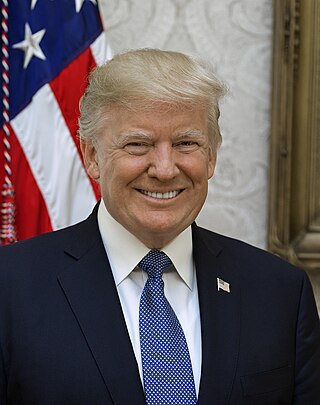
The president of the United States (POTUS) is the head of state and head of government of the United States of America. The president directs the executive branch of the federal government and is the commander-in-chief of the United States Armed Forces.

The National Archives and Records Administration (NARA) is an independent agency of the United States government within the executive branch, charged with the preservation and documentation of government and historical records. It is also tasked with increasing public access to those documents that make up the National Archives. NARA is officially responsible for maintaining and publishing the legally authentic and authoritative copies of acts of Congress, presidential directives, and federal regulations. NARA also transmits votes of the Electoral College to Congress. It also examines Electoral College and constitutional amendment ratification documents for prima facie legal sufficiency and an authenticating signature.

In the United States, the presidential library system is a nationwide network of 15 libraries administered by the Office of Presidential Libraries, which is part of the National Archives and Records Administration (NARA). These are repositories for preserving and making available the papers, records, collections and other historical materials of every president of the United States from Herbert Hoover, the 31st president from 1929–1933, to Donald Trump, the 45th president from 2017–2021. In addition to the library services, museum exhibitions concerning the presidency are displayed.

The President's Daily Brief, sometimes referred to as the President's Daily Briefing or the President's Daily Bulletin, is a top-secret document produced and given each morning to the president of the United States; it is also distributed to a small number of top-level US officials who are approved by the president. It includes highly classified intelligence analysis, information about covert operations, and reports from the most sensitive US sources or those shared by allied intelligence agencies. At the discretion of the president, the PDB may also be provided to the president-elect of the United States, between election day and inauguration, and to former presidents on request.

The Freedom of Information Act, 5 U.S.C. § 552, is the United States federal freedom of information law that requires the full or partial disclosure of previously unreleased or uncirculated information and documents controlled by the U.S. government, state, or other public authority upon request. The act defines agency records subject to disclosure, outlines mandatory disclosure procedures, and includes nine exemptions that define categories of information not subject to disclosure. The act was intended to make U.S. government agencies' functions more transparent so that the American public could more easily identify problems in government functioning and put pressure on Congress, agency officials, and the president to address them. The FOIA has been changed repeatedly by both the legislative and executive branches.
Judicial Watch (JW) is an American conservative activist group that files Freedom of Information Act (FOIA) lawsuits to investigate claimed misconduct by government officials. Founded in 1994, JW has primarily targeted Democrats, in particular the administrations of Bill Clinton, and Barack Obama as well as Hillary Clinton's role in them. It was founded by attorney Larry Klayman, and has been led by Tom Fitton since 2003.

The National Security Archive is a 501(c)(3) non-governmental, non-profit research and archival institution located on the campus of the George Washington University in Washington, D.C. Founded in 1985 to check rising government secrecy. The National Security Archive is an investigative journalism center, open government advocate, international affairs research institute, and the largest repository of declassified U.S. documents outside the federal government. The National Security Archive has spurred the declassification of more than 15 million pages of government documents by being the leading non-profit user of the U.S. Freedom of Information Act (FOIA), filing a total of more than 70,000 FOIA and declassification requests in its over 35+ years of history.
Citizens for Responsibility and Ethics in Washington (CREW) is a nonprofit 501(c)(3) U.S. government ethics and accountability watchdog organization. Founded in 2003 as a counterweight to conservative government watchdog groups such as Judicial Watch, CREW works to expose ethics violations and corruption by government officials and institutions and to reduce the role of money in politics.

Mark Reed Levin is an American broadcast news analyst, columnist, lawyer, political commentator, radio personality, and writer. Nicknamed The Great One, he is the host of syndicated radio show The Mark Levin Show, as well as Life, Liberty & Levin on Fox News. Levin worked in the administration of President Ronald Reagan and was a chief of staff for Attorney General Edwin Meese. He is the former president of the Landmark Legal Foundation, a New York Times best-selling author of seven books and contributes commentary to media outlets such as National Review Online. Since 2015, Levin has been editor-in-chief of the Conservative Review and is known for his incendiary commentary.

Donald John Trump is an American politician, media personality, and businessman who served as the 45th president of the United States from 2017 to 2021.

The Presidential Records Act (PRA) of 1978, 44 U.S.C. §§ 2201–2209, is an Act of the United States Congress governing the official records of Presidents and Vice Presidents created or received after January 20, 1981, and mandating the preservation of all presidential records. Enacted November 4, 1978, the PRA changed the legal ownership of the President's official records from private to public, and established a new statutory structure under which Presidents must manage their records. The PRA was amended in 2014, to include the prohibition of sending electronic records through non-official accounts unless an official account is copied on the transmission, or a copy is forwarded to an official account shortly after creation.
In the United States, a presidential transition is the process during which the president-elect of the United States prepares to take over the administration of the federal government of the United States from the incumbent president. Though planning for transition by a non-incumbent candidate can start at any time before a presidential election and in the days following, the transition formally starts when the General Services Administration (GSA) declares an “apparent winner” of the election, thereby releasing the funds appropriated by Congress for the transition, and continues until inauguration day, when the president-elect takes the oath of office, at which point the powers, immunities, and responsibilities of the presidency are legally transferred to the new president.

The FOIA Oversight and Implementation Act of 2014 is a bill that would amend the Freedom of Information Act in order to make it easier and faster to request and receive information. The bill would require the Office of Management and Budget to create a single FOIA website for people to use to make FOIA requests and check on the status of their request. The bill would also create a Chief FOIA Officers Council charged with reviewing compliance and recommending improvements. This bill would also require the federal agency to release the information it disclosed to the person who requested it publicly afterwards.

Planning for the presidential transition of Donald Trump, led by then vice president-elect, former governor Mike Pence of Indiana, began before Donald Trump won the United States presidential election on November 8, 2016, and became the president-elect. Trump was formally elected by the Electoral College on December 19, 2016. The transition was formerly led by Chris Christie until he and a number of his supporters were replaced or demoted on November 11. The results were certified by a joint session of Congress on January 6, 2017, and the transition ended when Trump was inaugurated at noon EST on January 20, 2017.

Donald Trump's handling of United States government records, especially those containing classified information, during his tenure as the 45th U.S. president has come under scrutiny. A number of incidents in which the president disclosed classified information to foreign powers and private individuals have become publicly known, sometimes with distinct national security and diplomatic consequences.

From 2017 through 2021, Donald Trump was the 45th president of the United States; he is the only American president to have no political or military service prior to his presidency, as well as the first to be charged with a felony after leaving office. He is regarded by historians as one of the worst presidents in U.S. history.

The first 100 days of Joe Biden's presidency began on January 20, 2021, the day Joe Biden was inaugurated as the 46th president of the United States. The first 100 days of a presidential term took on symbolic significance during Franklin D. Roosevelt's first term in office, and the period is considered a benchmark to measure the early success of a president. The 100th day of his presidency ended at noon on April 30, 2021.

On August 8, 2022, the Federal Bureau of Investigation (FBI) executed a search warrant at Mar-a-Lago, the residence of former U.S. president Donald Trump in Palm Beach, Florida.

In 2022, the Federal Bureau of Investigation (FBI) began a criminal investigation into former President Donald Trump's handling of classified and national defense-related government documents, looking for possible violations of the Espionage Act and obstruction of justice.
Between November 2022 and January 2023, approximately 25 to 30 classified government documents were discovered by President Joe Biden's attorneys in his former office at the Penn Biden Center in Washington, D.C., and in his personal residence in Wilmington, Delaware, dating to his time in the Senate and his vice presidency in the Obama administration.
















